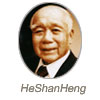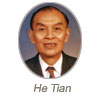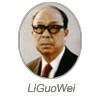AWARDEE OF TECHNOLOGICAL SCIENCES PRIZE
WANG SHOUJUE
Abstract
Wang Shoujue, specialist on semiconductor electronics, was born in June 1925 in Shanghai. He graduated from the Department of Electrical Engineering, Tong Ji University in 1949. Since graduation, he served as Research Assistant in the Institute of Radium, Beijing Academy in Shanghai. He joined the Institute of Applied Physics, Chinese Academy of Sciences in Beijing in 1956, and served as director of the Semiconductor Devices Laboratory since the founding of the Semiconductor Institute, CAS in 1960. He became deputy director and director of the Semiconductor Institute, CAS in 1977 and 1983 respectively. He was elected the academician of Chinese Academy of Sciences in 1980. He is now a research fellow in the Semiconductor Institute, CAS, in charge of the research laboratory on the Semiconductor Artificial Neural Networks. He is also a guest professor at the Tongji University in Shanghai and the Zhejiang University of Technology in Hangzhou.
Professor Wang developed the first domestic made high frequency switching transistor in 1958, for using in the early high speed transistorized computer, for computing in research works on the nuclear physics. He developed also the earliest silicon planar transistors and solid state circuits in China in 1963 and 1965, the Pattern Generator for LSI mask making in 1971. By using his invention on the Integrated High Speed Fuzzy Logic Circuit DYL, published in 1978, he reduced the converting time of 8 bit D/A convertor chips from 80 ns to 4 ns. In the last decade of the twentieth century, he worked and got significant achievements on the Semiconductor Artificial Neural Networks, including chips, hardware, mathematical model, algorithm and application on pattern recognition as well as process optimization.
Professor Wang has received the first-class award of National New Products Prize in 1964, the first-class as well as the second-class award of Scientifical and Technological Achievement Prize from CAS in 1980, 1983, 1992, and 1996, the first-class award of advance Science and Technology Prize Beijing in 2001. He also has twice received the National Invention Prize in 1964 and again in 1996.






